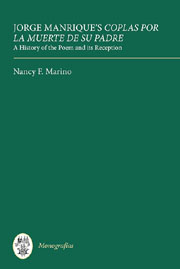Book contents
- Frontmatter
- Contents
- Dedication
- Acknowledgements
- Preface
- Chapter 1 The Author and His work
- Chapter 2 The Renaissance and Baroque Eras
- Chapter 3 Reception in the Eighteenth to Twenty-First Centuries
- Chapter 4 Shifting Literary Perspectives
- Afterword
- Appendix A Five Centuries at a Glance: A Selection of Comments about the Coplas
- Appendix B Additional Literary Responses since 1800
- Bibliography
- Index
Appendix A - Five Centuries at a Glance: A Selection of Comments about the Coplas
Published online by Cambridge University Press: 05 February 2013
- Frontmatter
- Contents
- Dedication
- Acknowledgements
- Preface
- Chapter 1 The Author and His work
- Chapter 2 The Renaissance and Baroque Eras
- Chapter 3 Reception in the Eighteenth to Twenty-First Centuries
- Chapter 4 Shifting Literary Perspectives
- Afterword
- Appendix A Five Centuries at a Glance: A Selection of Comments about the Coplas
- Appendix B Additional Literary Responses since 1800
- Bibliography
- Index
Summary
The following quotations will serve as a summary of the reception of Jorge Manrique's poem across the more than five hundred years since its first circulation around the time of his death in 1479.
Poco antes [de morir] había divulgado … unos versos de sentido más profundo que su educación y años requerían, llenos de maravillosa suavidad.
(Alfonso de Palencia, Cuarta Década, c. 1490–92)Tão necessario era a hum homem sabellas, como saber o Pater noster.
(Garcia de Resende, Crónica de dom João II, c. 1495)El famoso y docto caballero y católico poeta don Jorxe Manrique, comendador de Montizón, que hizo aquella obra que había de estar escrita con letras de oro … obra, por cierto, notable y de poeta cristiano y de grande y saludable doctrina y especial aviso para enmendar la vida.
(Gonzalo Fernández de Oviedo, Batallas y quinquagenas, c. 1526–35)Y son mejores las de don Jorge Manrique que comiençan Recuerde el almadormida, las cuales a mi juizio son muy dinas de ser leidas y estimadas, asi por la sentençia como por el estilo.
(Juan de Valdés, Diálogo de la lengua, 1533)Alabar un poeta a otro es memoria
para que suba a numero de estados.
El don íñigo López tuuo gloria
en sus versos paganos celebrados.
El don Iorge Manrique con victoria
cantó en poco los tiempos olvidados;
en poco que es tan grande, en breue suma,
que no ay tiempo ni oluido que consuma.
(Juan Mal de Lara, Hércules animoso, c. 1549–71)- Type
- Chapter
- Information
- Jorge Manrique's 'Coplas por la muerte de su padre'A History of the Poem and its Reception, pp. 178 - 182Publisher: Boydell & BrewerPrint publication year: 2011

